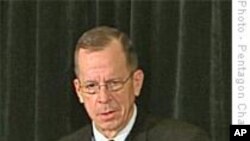The top U.S. military officer said Wednesday Afghan President Hamid Karzai must arrest and prosecute corrupt officials and take other action to establish the legitimacy of his government, following the fraud-marred election. Admiral Mike Mullen also estimated that if President Barack Obama approves a further surge of U.S. forces for Afghanistan, it should be possible to improve security and stability enough to begin withdrawing those forces within a few years.
Admiral Mullen told a gathering of civilian government executives now that President Karzai's re-election has been made official by the cancellation of the runoff, he must exercise his leadership to convince Afghans his government has their best interests at heart. "He's got to take concrete steps to eliminate corruption. That means that you have to rid yourself of those who are corrupt, you have to actually arrest and prosecute them. You have to show those visible signs," he said.
Admiral Mullen said the U.S. government is "extremely concerned" about corruption in Afghanistan, and that if the issue is not addressed, any U.S. and international military effort will not succeed. "If we don't get a level of legitimacy and governance, then all the troops in the world aren't going to make any difference," he said.
The admiral said it should be clear pretty quickly whether President Karzai is willing and able to take the steps necessary to fight corruption.
But at the same time, Admiral Mullen, who is Chairman of the Joint Chiefs of Staff, expressed confidence that with a solid Afghan partner, an increase in U.S. forces can bring a measure of security and stability to Afghanistan within a few years, as the 2007/2008 "surge" helped provide an opportunity for Iraq to move forward in a more secure environment.
"The timeline that we've talked about is actually, in a sense that, if I were to use the surge in Iraq,...look where we are right now, sort of apply the same kind of timeline to Afghanistan, as best we can tell, and we think that's reasonable, in terms of having the impact, and then being able to thin our forces out and bring them back," he said.
The Iraq surge involved about 20,000 U.S. combat troops over a period of a year and a half. President Obama is now considering whether to send more troops to Afghanistan. The U.S. and NATO commander there, General Stanley McChrystal, has said that without more troops the allied effort could fail. He is believed to be asking for as many as 40,000 troops, maybe more, on top of 68,000 U.S. troops and 40,000 from other countries, who are already there.
Admiral Mullen says additional troops would be used to provide more security for ordinary Afghans, in the hope they would turn against the insurgents. And he says that is already happening in areas where forces President Obama deployed earlier this year are operating.
"It is, in the end, about the people. And in a counterinsurgency the people of Afghanistan are going to throw the bad guys out. It's not going to be the kinetics (military action) that do it. We are starting to see positive effects like this in Helmand, where the Marines went in in July, in a place called Nawa, where the bazaar is open, as an example, and we see these classic counterinsurgency responses, where security exists," he said.
Admiral Mullen says while comparisons between Iraq and Afghanistan are not perfect, some lessons learned in Iraq in recent years can apply. He says both countries have armies that are developing well, police forces that are hampered by corruption but have potential, and both have economic capabilities that can be unleashed if the security situation improves. But he repeated his view that a military surge is not enough. He said a surge of foreign civilians to help with economic development and a variety of other issues is also needed.




